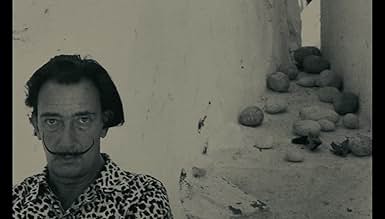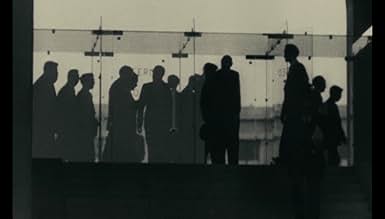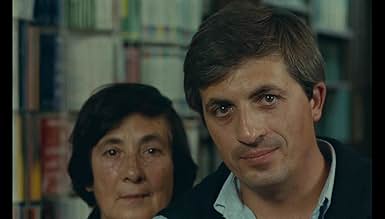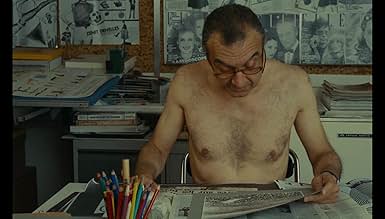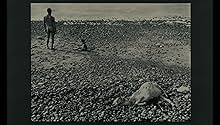Aggiungi una trama nella tua linguaAgnès Varda interviews two subjects from a photograph she took 30 years earlier.Agnès Varda interviews two subjects from a photograph she took 30 years earlier.Agnès Varda interviews two subjects from a photograph she took 30 years earlier.
- Regia
- Sceneggiatura
- Star
- Premi
- 1 vittoria in totale
Ulysse Llorca
- Self
- (as Ulysses Liorca)
Charles de Gaulle
- Self
- (filmato d'archivio)
- (non citato nei titoli originali)
Agnès Varda
- Self - Interviewer
- (voce)
- (non citato nei titoli originali)
- …
Recensioni in evidenza
A fascinating short in which Varda examines a photograph which she took in Egypt back in 1954. The photo consists of a standing, naked man to the upper right, a small, naked boy sitting to the right of him on the rocky beach, and far down in the right hand corner there is a dead goat. She goes back to Egypt and talks to the naked man (she interviews him naked), the boy, Ulysse, now a man, and others. She examines the photograph as a piece of her own existence (she started shooting her first film, La Pointe Courte, a few days after the photo was taken). It's a beautiful photograph, and a beautiful short film. 9/10.
10Vitarai
This film is now being exhibited as the middle section of a trilogy of documentaries about photography Ms. Varda has done over her career as Ciné Vardaphoto. If you get a chance to see any of the three you will be engaged into a vibrant examination of what is photography, memory, history, and the artistic process. Be prepared to think, and revel in one woman's amazing ability to constantly provoke us to examine and re-examine our human condition. Ulysse itself uses one particular photo the director took back in 1954 to re-examine both the time, subject(s), and meaning of that photo. What sounds like it could be a dry intellectual enterprise is treated with great care and love by Agnès Varda. What in less assured hands would seem pedantic turns into the revelatory. Anyone who can take the still image and breathe life into it deserves her ranking as one of the major film-makers in world cinema today or any day.
Varda is in her fascinating best here. In Documenteur a year before, she allowed herself to be submerged in the swirl of emotions, looking for entry into life that eluded her. It was perhaps a difficult time for her. Here she is absolutely crackling by contrast, erudite and playful.
She is again looking for entry, she finds it in an image, an old photo she took in '54. It shows a naked man looking out to sea, a boy, a dead goat, in a beach, evocative in its own right of ambiguous yearning for communion. But it becomes now a center for her, an opportunity to find entries of all sorts in the life behind images.
She finds the naked man again. She finds the boy, now a grown man with a family of his own, who has no recollection of posing for it. The most haunting thing, the boy had painted a drawing that Varda has kept, depicting the very same scene; in the painting the boy is touching the man.
She finds her own past of taking photos that spring of '54, we see a few. Through these, an opportunity to recall names and faces in her street, a mini-history in one place. Curious of what was going on in the world while she was snapping that photo, it now becomes an opportunity to revisit history, defeat in Dien Bien Phu that May, DeGaulle in Paris.
The image is taken and shown to kids, the kids asked what they think. Asked to compare it with the painting, they seem to prefer the photo, finding it more real. It had been staged by Varda of course, a product of the imagination. But the staging now, all through this, acquires gravity because it points to real things. This isn't just a photo Varda staged, it's one she really took that day.
And onwards it becomes an opportunity to weave small narratives of all sorts, about Ulysses, goats, contextual placement of the eye. All this is teased out in a playful way, as possible ribbons, for the joy of the image allowing these inroads; none of Godard's desire to stultify and provoke for Varda who is a calm soul.
It all points to how the image is pliant, a field where memories and narratives intersect. Some of these she has just improvised for us.
She is again looking for entry, she finds it in an image, an old photo she took in '54. It shows a naked man looking out to sea, a boy, a dead goat, in a beach, evocative in its own right of ambiguous yearning for communion. But it becomes now a center for her, an opportunity to find entries of all sorts in the life behind images.
She finds the naked man again. She finds the boy, now a grown man with a family of his own, who has no recollection of posing for it. The most haunting thing, the boy had painted a drawing that Varda has kept, depicting the very same scene; in the painting the boy is touching the man.
She finds her own past of taking photos that spring of '54, we see a few. Through these, an opportunity to recall names and faces in her street, a mini-history in one place. Curious of what was going on in the world while she was snapping that photo, it now becomes an opportunity to revisit history, defeat in Dien Bien Phu that May, DeGaulle in Paris.
The image is taken and shown to kids, the kids asked what they think. Asked to compare it with the painting, they seem to prefer the photo, finding it more real. It had been staged by Varda of course, a product of the imagination. But the staging now, all through this, acquires gravity because it points to real things. This isn't just a photo Varda staged, it's one she really took that day.
And onwards it becomes an opportunity to weave small narratives of all sorts, about Ulysses, goats, contextual placement of the eye. All this is teased out in a playful way, as possible ribbons, for the joy of the image allowing these inroads; none of Godard's desire to stultify and provoke for Varda who is a calm soul.
It all points to how the image is pliant, a field where memories and narratives intersect. Some of these she has just improvised for us.
Lo sapevi?
- ConnessioniEdited into Cinévardaphoto (2004)
I più visti
Accedi per valutare e creare un elenco di titoli salvati per ottenere consigli personalizzati
Dettagli
- Data di uscita
- Paese di origine
- Lingua
- Celebre anche come
- 尤里西斯
- Azienda produttrice
- Vedi altri crediti dell’azienda su IMDbPro
- Tempo di esecuzione22 minuti
- Colore
- Mix di suoni
- Proporzioni
- 1.66 : 1
Contribuisci a questa pagina
Suggerisci una modifica o aggiungi i contenuti mancanti


